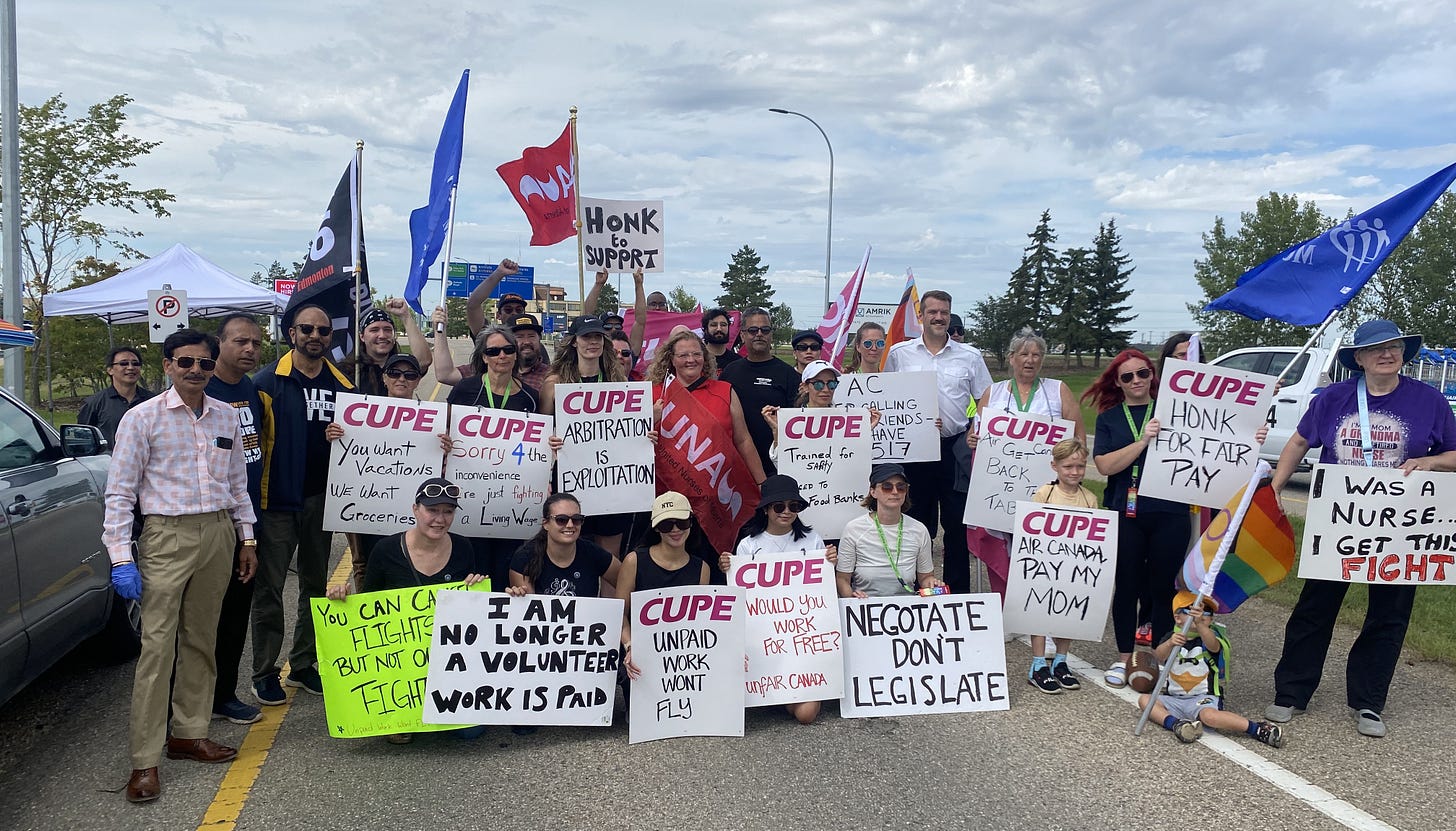Flight attendants picket Edmonton airport for fair pay, defying federal strike ban
"It’s just been a creeping situation, where people are saying, ‘Enough is enough. No longer is our labour going to be free.'"

Air Canada flight attendants defiantly walked picket lines at airports across the country on Monday, a day after the federal government ordered them back to work.
The demand of the 10,000 flight attendants represented by the Canadian Union of Public Employees (CUPE) is simple—to be paid for all their work.
As it stands, flight attendants are only paid their full wage for time that their flight is in the air. The employer has offered to compensate them 50% of their wage for “ground work,” but the union is pushing for full pay.
Air Canada, which was publicly owned before Prime Minister Brian Mulroney sold it off in 1989, has offered flight attendants a 17.2% compounded pay increase over four years, which CUPE has rejected as being nowhere near the 28% compounded inflation rate since 2015, when their most recent contract was signed.
CUPE gave Air Canada the required 72-hour strike notice on Aug. 13, which the airline pre-empted by issuing a lockout notice and cancelling hundreds of flights.
On Sunday, the day after the lockout commenced, Jobs Minister Patty Hajdu—there’s no labour minister in Prime Minister Mark Carney’s government—ordered the flight attendants back to work by imposing binding arbitration on both parties.
In response, the Canada Industrial Relations Board declared CUPE’s strike “unlawful,” ordering the union to tell its members by Monday at noon EST to return to work.
But CUPE national president Mark Hancock told his members to hold the line.
The picket line outside Edmonton International Airport on Monday was small but boisterous, owing to Air Canada’s lack of official presence in Alberta’s capital, with its offices located in Calgary.
Active flight attendants were reluctant to speak to media, given the legal precarity of their strike.
Sherry Hansen-Smith, a flight attendant of 35 years who retired in 2021, has seen the consolidation of Canada’s airline industry first hand.
Hansen-Smith began her career with Pacific Western Airlines, which was amalgamated into Canadian Airlines in 1987 and then purchased by Air Canada in 2001.
During that time, she’s served as the president of her CUPE local and vice-president of the Alberta Federation of Labour.
“Trying to get recognition for unpaid work is something that we’ve traditionally fought for over the years. I understand their struggle, because I did it for 35 years. I totally get it,” said Hansen-Smith.
Because of the length of CUPE’s previous contract, she added, “a lot of things are coming to the forefront” that went unaddressed for a decade, including the “extraordinary measures” that had to be taken during the Covid pandemic.
“We need those things to be addressed now and I don’t think that’s any different than working people in the province,” said Hansen-Smith.
With the growing size of aircrafts, increasing number of passengers and boarding starting earlier in the day, flight attendants’ needs have only grown, she noted.
“It’s just been a creeping situation, where people are saying, ‘Enough is enough. No longer is our labour going to be free,’” Hansen-Smith said, as chants of So-so-so-solidarity punctuated the background.
James Yang, a retired flight attendant with Canadian North, cited some examples of free labour that is normalized for attendants, who are expected to check in an hour or two prior to departure.
“We're really only covered from the time you close the main cabin door until the cabin door opens,” said Yang.
Before passengers board, flight attendants do their pre-flight briefings, safety checks, equipment checks and ensure that they have the correct meals for passengers.
As passengers disembark from the plane, flight attendants resume their unpaid labour.
“Nobody really should be working for free. Not a single soul, if you ask them, would say that they will work for free,” Yang added.
It wasn’t just flight attendants on the picket line in Edmonton.
They were joined by members of the Air Line Pilots Association, Alberta Union of Provincial Employees, United Nurses of Alberta, the Canadian Union of Postal Workers, who provided lunch, and the Teamsters.
While I was there, the flight attendants received many supportive honks from passers-by, with just one person flipping them the bird.
CN Rail train conductor Alan Christie, a shop steward with his Teamsters local, emphasized the injustice of “unpaid labour.”
“To me, it’s wild that’s even entertained in the first place,” he said.
Railway conductors are paid primarily by mileage, meaning they’re also not paid for time when their mode of transportation isn’t moving, except when it’s in the terminal.
“As soon as we leave, we’re paid by the mile, so if we’re not moving miles, we’re not getting paid at all,” said Christie.
An important difference, he emphasized, is that there isn’t a lot of work to do when a train isn’t moving, whereas for flight attendants, “arguably the most difficult part of their job” before the plane even takes off.
“Getting people into the seats, packing up the luggage, taking care of all the pre-flight stuff—that’s all off pay,” Christie said.
The Teamster had harsh words for the federal Liberal government’s effort to break the strike.
“As workers, our leverage at the bargaining table is withdrawing our labour, essentially. For a government to step in and take away that right for all workers in Canada is unconscionable,” said Christie.
“It’s imperative that all workers stand up against this and I’m more than happy to come here and show my support in whatever way I can.”

